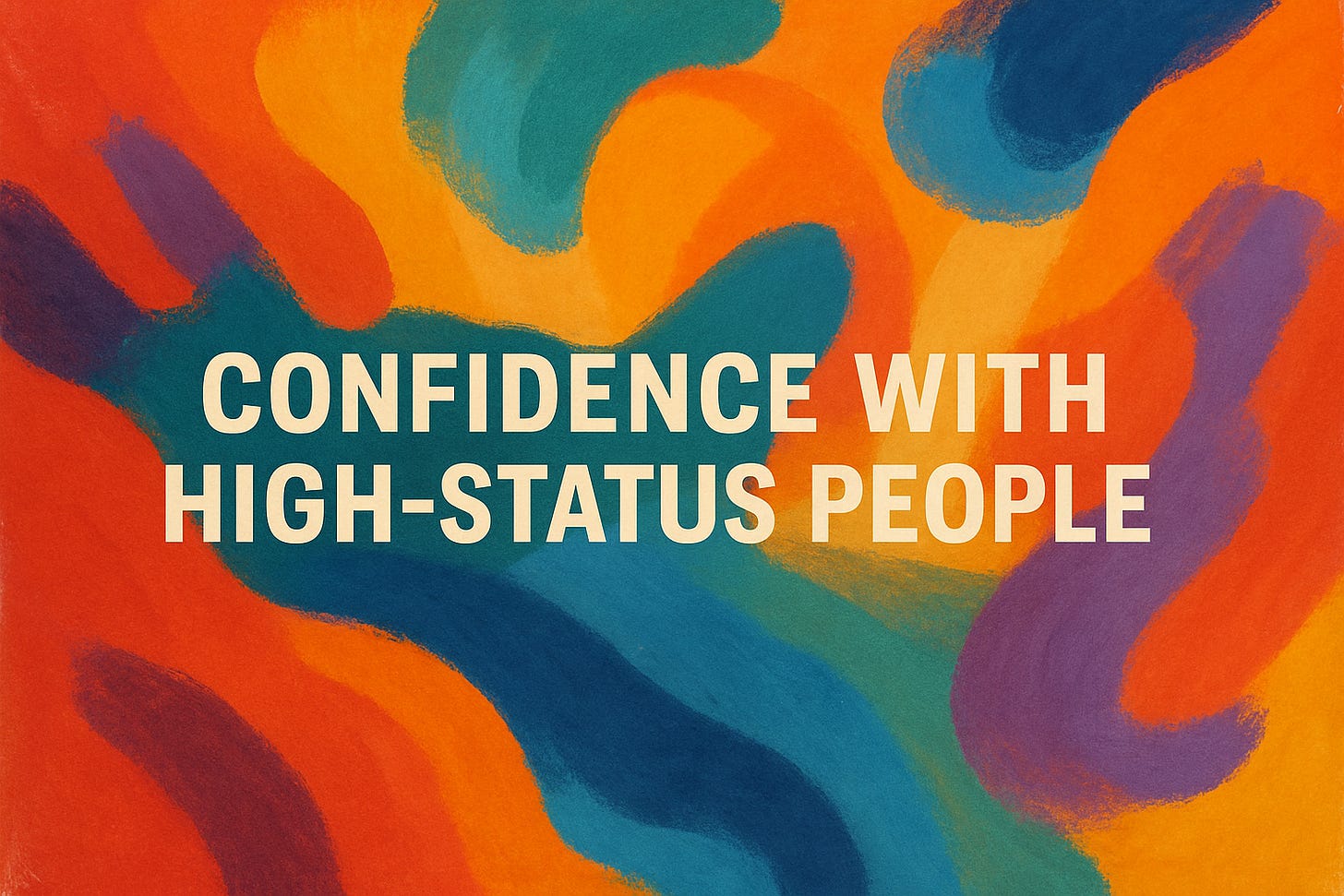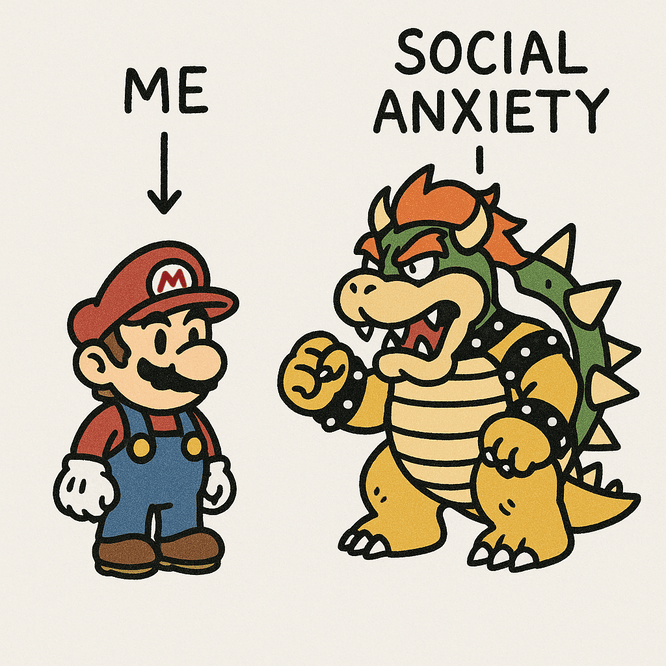6 Tips to Feel Confident Around “High-Status” People
My goal with writing is to share the wisdom that has been most helpful to me. Sometimes, that will involve a cringe-worthy headline like this. Enjoy!
If you like reading this article, feel free to click the ❤️ or 🔄 button on this post so more people can discover it on Substack 🙏
My goal with writing is to share the wisdom that has been most helpful to me. Sometimes, that will involve a cringe-worthy headline like this. Enjoy!
So much of my journey to wholeness and becoming an effective leader has revolved around overcoming social anxiety. As I cultivated more self-worth and practiced the Social Flow principles that helped me be myself in social situations, the anxiety started to drift away.
But for a long time, especially in my early thirties, there was one particular space where I still experienced a high degree of contraction. It was when I found myself in the company of people we might call “high status.”
Even though I had developed an authentic confidence and social skills that allowed me to walk into a room and connect with almost anyone, whenever I entered spaces with celebrities, highly visible entrepreneurs, or influential investors, I would still notice myself shrinking, worrying, trying to say the right thing. It was out of alignment with who I knew myself to be and how I wanted to operate.
Learning how to feel fully myself around high status people became the FINAL BOSS of overcoming social anxiety.
Here are the key realizations that helped me cross that threshold:
1. Stop networking, start connecting
Networking is the intentional process of connecting and building relationships to further your career or life in some direct or indirect way. It has its place. But it’s not what I’m talking about here.
To feel confident around “high-status” folks, it is far more effective and enjoyable to optimize for connection.
Connection is the generative exchange of energy between people that is grounded in authenticity, curiosity, and presence. Connecting has nothing to do with building a relationship long-term. It’s about the experience of being with someone, allowing whatever emerges to emerge.
This shift is essential around high status people because we often put pressure on ourselves to get something from the interaction. We want the relationship to go somewhere. And that subtle grasping pulls us out of presence and into performance. Out of connection and into networking.
We start trying to build a relationship before even knowing the person, based on an assumption of some access or value they might give us.
Instead, connect. Don’t network. Let the interaction be enough and make it awesome for awesome’s sake.
2. Understand where the anxiety comes from
The anxiety many of us feel around high status people is rooted in two core patterns:
First, we perceive an asymmetry of status.
We unconsciously and instinctively assess status across four core categories…
Money
Fame
Power
Beauty
We assume, not incorrectly, that proximity to these vectors of influence might benefit us. So we put extra pressure on being liked by these people. We want to be picked and that pressure creates anxiety.
Pressure on its own is not a bad thing. In fact, pressure is required for us to perform our best and tap into true flow states. With that said, the second pattern often transforms this pressure into unproductive anxiety.
Second, we project old stories about our self-worth.
If we carry a shame-based belief that we are not enough, and then we encounter someone with obvious social status, we start to unconsciously think:
“If they like me, it means that story isn’t true. It means I have value.”
“If they don’t like me, it’s because this story that I’m not enough is true.”
Suddenly, everything is riding on these interactions to fill the unfillable pit of “not-enoughness”, and we start performing instead of being present.
When being liked is unconsciously associated with being enough, we are far more likely to abandon ourselves, stress and act out of alignment to be liked.
Understanding these drivers helps you name the pattern, which is the first step toward shifting it.
If you want to go deeper on how to integrate these shame stories, read this article.
3. Clarify your own value
When we feel anxious around high status people, it’s often because we’re perceiving a gap in our value. We’re seeing them as more valuable in some way.
We don’t want to try and overcome that gap by saying or doing anything. We overcome it by anchoring into our own value, by remembering who we are and what our unique value is to bring.
Consider these…
What makes the people in your life better off for knowing you?
What qualities do you love about yourself?
How do you positively impact the people around you?
Answering those questions is more powerful than memorizing any social script. When you are rooted in your own self-worth, you stop outsourcing it to others.
–
One of the most transformational beliefs I’ve developed in this work was surprisingly simple.
“Anyone who truly gets to know me is better off for it”
I didn’t just make that up to feel better. I earned it. I built enough relationships and received enough feedback over the years to know that it’s true to me. My friends, my clients, my community, the people who know me deeply are better off for it. And I trust that.
It’s not objectively true, but I believe it to be and…
That belief allows me to show up fully with pretty much anyone.
Not because I need them to see my value, but because I already do.
If they want to connect, great.
If they don’t, I don’t make it mean anything.
If you want to go deeper on clarifying your value and crafting an empowered sense of self, read this.
4. Optimize for your own enjoyment, not their approval
Social anxiety, at its core, is fear of judgment. And nothing amplifies that fear like trying to be liked.
So instead of optimizing for external validation, focus on your own intrinsic enjoyment.
What conversations light you up?
What are you genuinely curious about?
What topics make you feel most alive and engaged?
Pursue the answers to those questions, regardless of whether you think the other person is or not.
I remember giving a very close friend of mine this advice one night when he was reluctant to go to a founder dinner because he was feeling down. He was struggling to raise a round of financing for several months. He followed my advice and started to ask people what they were struggling with at the moment. Within 30 minutes, the entire dinner table had congregated around him, eager to share their own challenges. He found an effortless flow talking about what he was interested in, not trying to fit the mold of what he thought other people needed him to be.
When you shift your orientation toward your own enjoyment, the pressure drops. You start to enjoy yourself, regardless of how the interaction goes. The people around us pick up on this intrinsic motivation and self-assuredness and gravitate towards it.
My social flow framework has helped me anchor into this: pursuing what’s energizing, interesting, and real for me in the moment.
INTENTIONALITY - “How do I want to be?”
CURIOSITY - “What do I want to know?”
AUTHENTICITY - “What is true for me now?” (thoughts / feelings)
NOW - “How can I be more present?”
Answer these questions, and you’ll find an authentic path into the conversation you want to have.
When we become more focused on the process than a set goal, we tend to achieve those goals with less effort. In flow state research, they would call this "having a clear goal loosely held."
5. Be a friend, not a fanboy
I built a company around appreciation, so I’m all for sharing it.
If someone has inspired or impacted you, let them know. Be specific. Be sincere.
But there’s a line between appreciation and idolization.
Fanboy energy is often rooted in putting someone above you. It’s placing them on a pedestal instead of seeing them as human. That energy can feel uncomfortable for everyone involved.
Here’s a simple way I express appreciation without tipping into fanboy mode:
“I really loved your work in ___ because it helped me ___.”
“I use your product and it’s made my life better in these specific ways.”
Focus on the contributions, not the person.
Appreciation is beautiful. Just be mindful of the energy behind it.
6. Replace assumptions with curiosity
When someone has a public persona or social power, we tend to assume we know what they’re like. We often imagine they are too busy, too cool, too important to connect.
That story lives in our mind and is typically trying to protect you from the threat of rejection.
The truth is, you have no idea what their life is like or what kind of connection they’re open to.
So instead of assuming, be curious.
What do you want to know about this person?
What do you find interesting about them as a human being?
What might you share that’s real for you?
Curiosity brings us back to presence.
And our power to connect deeply always resides in presence.
Final Thought
If you've ever found yourself shrinking in one of those “high-status” rooms, I hope you can give yourself some grace. As social mammals, it’s completely reasonable to feel heightened anxiety around people we perceive as influential.
Next time you’re in the company of someone who inspires you, I hope these questions and prompts offer a small pathway back to simply being yourself and showing up in a way that feels true to you.
I’m also curious…
What frames or beliefs have helped you operate effectively in high-stakes, high-status situations?
Would love to hear from ya.







In high-stakes situations, I remind myself that everyone — no matter how impressive — still navigates the same human basics: insecurity, uncertainty, and oh yes… everyone poops, maybe accidentally (or not) eats a bugger or two and occasionally gets spinach stuck between their teeth. It’s silly, I know — but profoundly effective, and my irreverent way of staying grounded.
Remembering that status doesn’t exempt anyone from being human, softens the performance pressure and lets me show up more freely — not trying to impress, just willing to connect. And oddly enough, that’s what often leaves the strongest impression.
Everybody poops! Silly is often the portal to the deepest truth :)